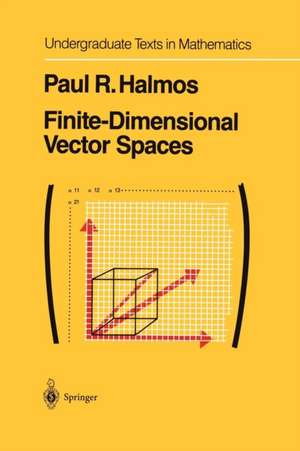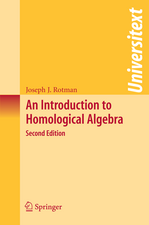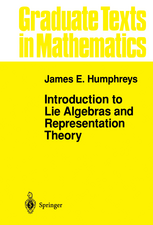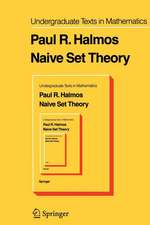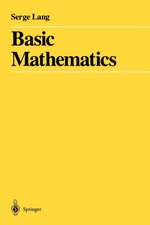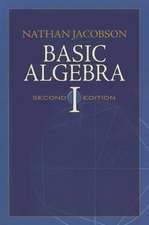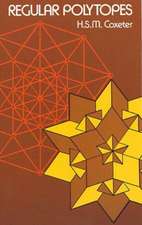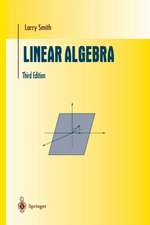Finite-Dimensional Vector Spaces: Undergraduate Texts in Mathematics
Autor P.R. Halmosen Limba Engleză Paperback – 11 noi 2011
| Toate formatele și edițiile | Preț | Express |
|---|---|---|
| Paperback (1) | 416.27 lei 6-8 săpt. | |
| Springer – 11 noi 2011 | 416.27 lei 6-8 săpt. | |
| Hardback (1) | 423.58 lei 6-8 săpt. | |
| Springer – 1974 | 423.58 lei 6-8 săpt. |
Din seria Undergraduate Texts in Mathematics
- 17%
 Preț: 362.13 lei
Preț: 362.13 lei - 17%
 Preț: 365.42 lei
Preț: 365.42 lei - 20%
 Preț: 466.83 lei
Preț: 466.83 lei -
 Preț: 370.77 lei
Preț: 370.77 lei -
 Preț: 351.54 lei
Preț: 351.54 lei - 17%
 Preț: 368.60 lei
Preț: 368.60 lei -
 Preț: 304.91 lei
Preț: 304.91 lei -
 Preț: 257.71 lei
Preț: 257.71 lei -
 Preț: 380.26 lei
Preț: 380.26 lei -
 Preț: 400.42 lei
Preț: 400.42 lei -
 Preț: 280.65 lei
Preț: 280.65 lei -
 Preț: 372.26 lei
Preț: 372.26 lei - 17%
 Preț: 373.59 lei
Preț: 373.59 lei - 17%
 Preț: 367.24 lei
Preț: 367.24 lei -
 Preț: 358.10 lei
Preț: 358.10 lei -
 Preț: 339.36 lei
Preț: 339.36 lei - 17%
 Preț: 366.38 lei
Preț: 366.38 lei -
 Preț: 290.80 lei
Preț: 290.80 lei - 17%
 Preț: 362.67 lei
Preț: 362.67 lei - 17%
 Preț: 395.93 lei
Preț: 395.93 lei -
 Preț: 407.96 lei
Preț: 407.96 lei -
 Preț: 298.00 lei
Preț: 298.00 lei -
 Preț: 359.48 lei
Preț: 359.48 lei -
 Preț: 415.94 lei
Preț: 415.94 lei -
 Preț: 407.62 lei
Preț: 407.62 lei -
 Preț: 364.40 lei
Preț: 364.40 lei -
 Preț: 332.02 lei
Preț: 332.02 lei -
 Preț: 402.33 lei
Preț: 402.33 lei -
 Preț: 400.42 lei
Preț: 400.42 lei -
 Preț: 440.01 lei
Preț: 440.01 lei - 15%
 Preț: 417.73 lei
Preț: 417.73 lei - 13%
 Preț: 389.61 lei
Preț: 389.61 lei -
 Preț: 424.14 lei
Preț: 424.14 lei -
 Preț: 433.85 lei
Preț: 433.85 lei -
 Preț: 395.09 lei
Preț: 395.09 lei - 19%
 Preț: 400.52 lei
Preț: 400.52 lei -
 Preț: 329.94 lei
Preț: 329.94 lei - 19%
 Preț: 492.82 lei
Preț: 492.82 lei -
 Preț: 396.24 lei
Preț: 396.24 lei -
 Preț: 390.08 lei
Preț: 390.08 lei - 15%
 Preț: 521.04 lei
Preț: 521.04 lei -
 Preț: 402.00 lei
Preț: 402.00 lei - 15%
 Preț: 531.72 lei
Preț: 531.72 lei - 15%
 Preț: 447.81 lei
Preț: 447.81 lei - 15%
 Preț: 533.53 lei
Preț: 533.53 lei -
 Preț: 390.08 lei
Preț: 390.08 lei
Preț: 416.27 lei
Nou
Puncte Express: 624
Preț estimativ în valută:
79.65€ • 83.37$ • 66.30£
79.65€ • 83.37$ • 66.30£
Carte tipărită la comandă
Livrare economică 31 martie-14 aprilie
Preluare comenzi: 021 569.72.76
Specificații
ISBN-13: 9781461263890
ISBN-10: 1461263891
Pagini: 212
Ilustrații: VIII, 202 p.
Dimensiuni: 155 x 235 x 17 mm
Greutate: 0.3 kg
Ediția:1958
Editura: Springer
Colecția Springer
Seria Undergraduate Texts in Mathematics
Locul publicării:New York, NY, United States
ISBN-10: 1461263891
Pagini: 212
Ilustrații: VIII, 202 p.
Dimensiuni: 155 x 235 x 17 mm
Greutate: 0.3 kg
Ediția:1958
Editura: Springer
Colecția Springer
Seria Undergraduate Texts in Mathematics
Locul publicării:New York, NY, United States
Public țintă
Lower undergraduateCuprins
I. Spaces.- 1. Fields.- 2. Vector spaces.- 3. Examples.- 4. Comments.- 5. Linear dependence.- 6. Linear combinations.- 7. Bases.- 8. Dimension.- 9. Isomorphism.- 10. Subspaces.- 11. Calculus of subspaces.- 12. Dimension of a subspace.- 13. Dual spaces.- 14. Brackets.- 15. Dual bases.- 16. Reflexivity.- 17. Annihilators.- 18. Direct sums.- 19. Dimension of a direct sum.- 20. Dual of a direct sum.- 21. Quotient spaces.- 22. Dimension of a quotient space.- 23. Bilinear forms.- 24. Tensor products.- 25. Product bases.- 26. Permutations.- 27. Cycles.- 28. Parity.- 29. Multilinear forms.- 30. Alternating forms.- 31. Alternating forms of maximal degree.- II. Transformations.- 32. Linear transformations.- 33. Transformations as vectors.- 34. Products.- 35. Polynomials.- 36. Inverses.- 37. Matrices.- 38. Matrices of transformations.- 39. Invariance.- 40. Reducibility.- 41. Projections.- 42. Combinations of pro¬jections.- 43. Projections and invariance.- 44. Adjoints.- 45. Adjoints of projections.- 46. Change of basis.- 47. Similarity.- 48. Quotient transformations.- 49. Range and null-space.- 50. Rank and nullity.- 51. Transformations of rank one.- 52. Tensor products of transformations.- 53. Determinants.- 54. Proper values.- 55. Multiplicity.- 56. Triangular form.- 57. Nilpotence.- 58. Jordan form.- III. Orthogonality.- 59. Inner products.- 60. Complex inner products.- 61. Inner product spaces.- 62. Orthogonality.- 63. Completeness.- 64. Schwarz’s inequality.- 65. Complete orthonormal sets.- 66. Projection theorem.- 67. Linear functionals.- 68. Parentheses versus brackets.- 69. Natural isomorphisms.- 70. Self-adjoint transformations.- 71. Polarization.- 72. Positive transformations.- 73. Isometries.- 74. Change of orthonormal basis.- 75. Perpendicular projections.- 76. Combinations of perpendicular projections.- 77. Complexification.- 78. Characterization of spectra.- 79. Spectral theorem.- 80. Normal transformations.- 81. Orthogonal transformations.- 82. Functions of transformations.- 83. Polar decomposition.- 84. Commutativity.- 85. Self-adjoint transformations of rank one.- IV. Analysis.- 86. Convergence of vectors.- 87. Norm.- 88. Expressions for the norm.- 89. Bounds of a self-adjoint transformation.- 90. Minimax principle.- 91. Convergence of linear transformations.- 92. Ergodic theorem.- 93. Power series.- Appendix. Hilbert Space.- Recommended Reading.- Index of Terms.- Index of Symbols.
Recenzii
“This is a classic but still useful introduction to modern linear algebra. It is primarily about linear transformations … . It’s also extremely well-written and logical, with short and elegant proofs. … The exercises are very good, and are a mixture of proof questions and concrete examples. The book ends with a few applications to analysis … and a brief summary of what is needed to extend this theory to Hilbert spaces.” (Allen Stenger, MAA Reviews, maa.org, May, 2016)
“The theory is systematically developed by the axiomatic method that has, since von Neumann, dominated the general approach to linear functional analysis and that achieves here a high degree of lucidity and clarity. The presentation is never awkward or dry, as it sometimes is in other “modern” textbooks; it is as unconventional as one has come to expect from the author. The book contains about 350 well placed and instructive problems, which cover a considerable part of the subject. All in all this is an excellent work, of equally high value for both student and teacher.” Zentralblatt für Mathematik